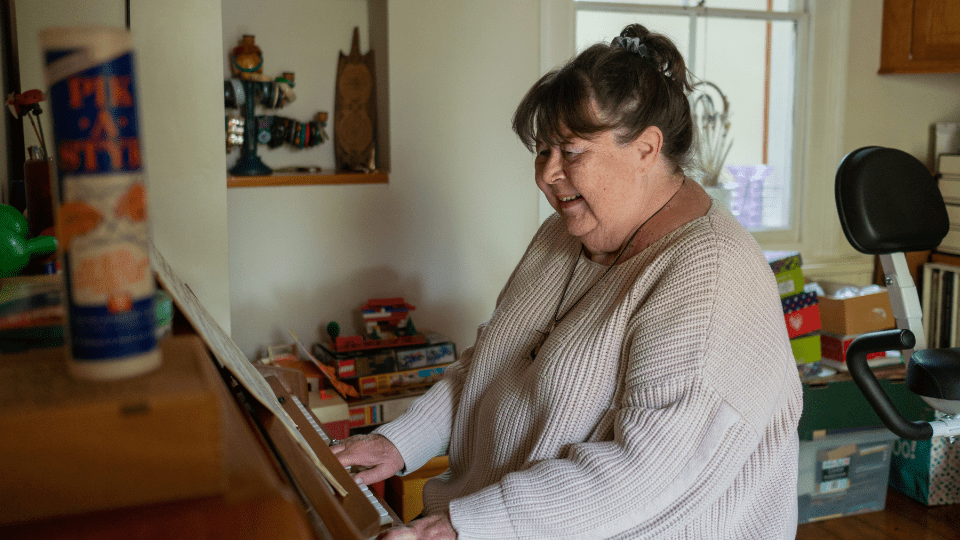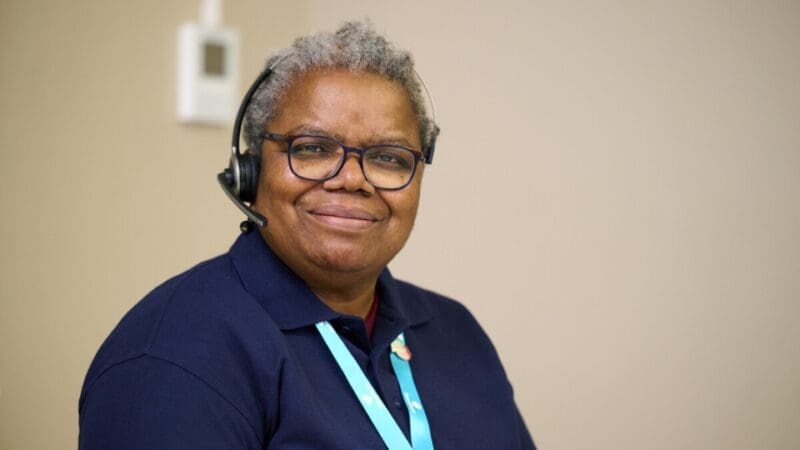
Music and dementia
For people with dementia, music can be a powerful way to trigger positive feelings and connect with other people.

Ahead of the Eurovision Song Contest Grand Final, Kerry Lyons, Consultant Admiral Nurse for Frailty and Physical Health, talks about the importance of music for people with dementia
The Eurovision Song Contest is an annual celebration of music, bringing together family and friends to enjoy the variety of songs performed by the competing countries.
Music holds a special place in many people’s lives, especially when enjoyed with loved ones, and this is no exception for those living with dementia.
As an Admiral Nurse, I see first-hand the positive impact that music can have on people with dementia and their families and carers. Here are some of these ways.
Listening to a song that you have not heard in years can transport you back in time.
Music has the unique ability to trigger memories and emotions, and for people with dementia, it can bring back moments from their past that other forms of communication may not reach.
This can help them to feel more connected to their personal history and identity.
Penny’s mum, Rosemary, who used to be a piano teacher, lives with mixed dementia. “Mum still loves music and continued to teach piano after the diagnosis,” says Penny. “I get glimpses of her when we sit down at the piano together and she critiques my playing.”
Music also provides an opportunity to reminisce together. How does the song make someone think and feel? What special memories does it evoke?
Kaur, whose dad, Mohinder, has mixed dementia, says: “Dad’s favourite singer is Mohammed Rafi, a very famous Bollywood singer. At parties, weddings and everything in between, he needed no encouragement to take the microphone and start singing. Since he had a major stroke, his singing hasn’t been the same, but every now and then, I will still hear him break into song. I love listening to him sing – it reminds me of all those happy memories growing up.”
Music can be a great source of joy for people with dementia, enabling them to express feelings that may be difficult to articulate otherwise.
Elliott, whose dad had young onset Alzheimer’s disease, says: “I honestly believe music kept Dad going in the later stages of his dementia. When he was in hospital in his final weeks, we brought him an MP3 player and put the earphones in so we could play music for him. Even though his eyes were closed and he couldn’t communicate, you could see him light up and try to sing.”
Listening to familiar tunes can evoke positive emotions, helping to reduce anxiety and provide comfort, whilst regular exposure to music can help manage any feelings of agitation.
Michaela’s nan, Vanda, grew up in St Lucia and despite moving to London in her 20s, never lost her passion for reggae music – even after her vascular dementia diagnosis. “When Nan didn’t want to get out of bed, I’d play Bob Marley’s song, ‘Get Up, Stand Up’, and she started dancing and singing the lyrics,” Michaela says. “It was a way to slowly get her out of bed. That was one of our favourite songs to play.”
Engaging with music in a meaningful way can help to maintain the mental abilities of a person with dementia. Whether through listening to music, singing or playing an instrument, it can bring a sense of accomplishment.
If the person has a musical background (or even if they don’t!), encouraging them to sing or play an instrument may boost their self-esteem, helping them to focus on what they can do, rather than what they cannot.
Penny shares: “Mum was a talented musician and played piano, oboe, viola and sang. Music is so important to her, and it keeps her mind active.”
After being diagnosed with young onset dementia, Eugene never forgot music. His wife, Diana, says: “When I visited Eugene in his care home, I would play music on my phone, and he would ‘air play’ and tap along to the song as if he were playing his steel drums.”
Music often brings people together. Diana shares: “Eugene and I shared a passion for music. He played the keyboard and steel drums at the annual summer fair at the care home. He certainly kept the other residents entertained!”
Group activities, like choirs or music therapy sessions, can reduce feelings of isolation in people with dementia and can promote a sense of community.
Michaela set up and runs Spring Bleau Dementia Café. “We have music and play people’s favourite songs in the background, encompassing a bit of everybody who comes to the café,” she explains. “I think community is really important after a dementia diagnosis, because in the end, it’s the community that holds you together.”
If you are watching the Eurovision Song Contest with a person with dementia, this can be a great opportunity to reminisce about your favourite memories and songs from past competitions that you have enjoyed together.
As I support more families affected by dementia, I am sure that I will continue to hear stories about the positive impact that music can have on those affected.
I hope that the power of music can also provide some benefit for you.
Image cedit: Elliot Manches

For people with dementia, music can be a powerful way to trigger positive feelings and connect with other people.

Head of Research and Publications at Dementia UK, Dr. Karen Harrison Dening, introduces this blog post pointing to why meaningful activities are so important for someone with dementia.

Whether you have a question that needs an immediate answer or need emotional support when life feels overwhelming, these are the ways our dementia specialist Admiral Nurses can support you.